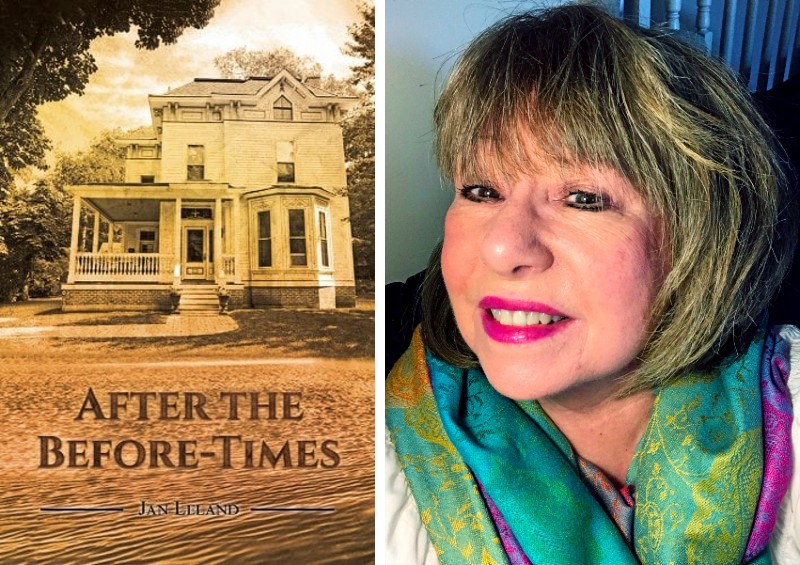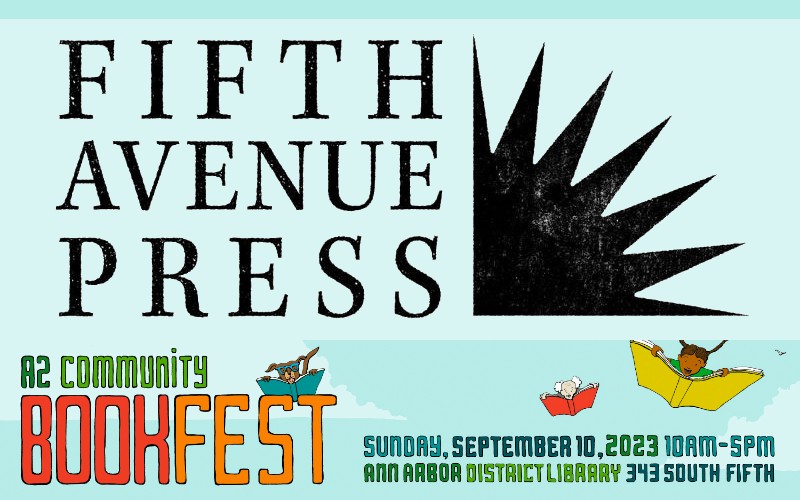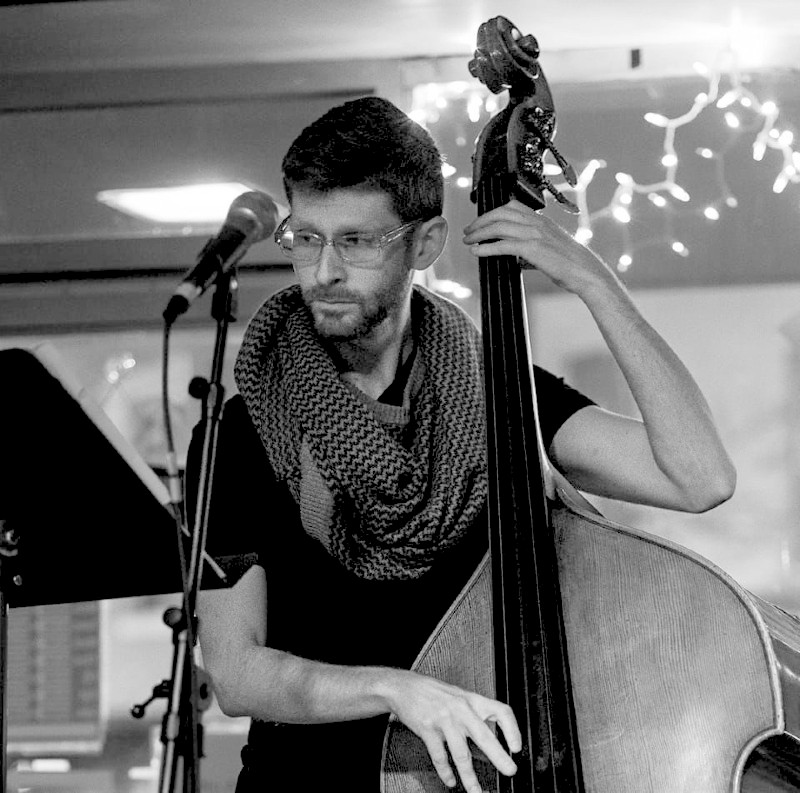Out of This World: deegeecee finds relief on and off Earth on “Sundogs & Weekends on the Moon” album

deegeecee didn’t expect to find creative inspiration from a set of scientific encyclopedias.
The Ypsilanti hip-hop artist and writer read different volumes on his breaks while working as a substitute teacher at a middle school.
“From one of them, I learned the term ‘anthelion,’ which is similar to a sun dog,” said deegeecee, aka Daryhl Covington. “I looked it up later, and it had a cool picture that was associated with it … and I saw a sun dog.”
That fascination led deegeecee down a Reddit and Google rabbit hole where he learned more about the atmospheric phenomenon.
“It’s all the crazy stuff that happens in the world naturally … it felt cosmically humbling,” deegeecee said. “I was also reading a lot about spirituality and the guru movements of the ‘80s and ‘90s … it was like, ‘What if I could take that mystic feeling and put that in everyday words and stories that made sense?’”
Those words and stories resulted in deegeecee’s contemplative new album, Sundogs & Weekends on the Moon, which features 15 tracks about loss, self-doubt, growth, and change.
“It’s about dealing with loss, whether that’s the loss of a person or the loss of the past,” he said. “It’s [also] about my thoughts on life and the artistic process and coming to terms with the type of artist that I want to be and where that’s going to position me.”
On Sundogs & Weekends on the Moon, deegeecee positions himself in a mystical world filled with poetic lyrics, hypnotic beats, post-rock and film score samples, cosmic imagery, and manga references.
We recently spoke to deegeecee about his background, the creative process for his debut album, his appreciation for manga and Japanese culture, select album tracks and collaborators, and upcoming plans.
The debut novel by Ann Arbor author and therapist Jan Leland follows characters processing emotions in the early days of the pandemic

We all collectively endured the pandemic, but we each had an individual experience of it.
The unique but relatable stories from 2020 to 2021 are what Jan Leland tells in her new novel, After the Before-Times.
The circumstances in which Leland’s characters’ find themselves all differ, but they converge at the same time—when COVID-19 emerges—and in the same place: the Clearview Inn on Orchard Lake in Keego Harbor, Michigan. Through these characters, Leland portrays the stress and anguish—as well as the triumphs and coping mechanisms—of the early days of the pandemic.
One of these characters, Ashley Cooper who is known as Ash, works at The Book Shelf in town. The coronavirus affects her early on when her boss and close friend, Marla Phillips, sickens and passes away. As Leland is attentive to character development, we learn about Ash in detail:
Pretty and petite with shiny shoulder length curly brown hair and brown eyes, high cheekbones and dimples, Ashley was smart and curious. Although Marla felt Ashley needed life experience, she perceived an inner strength to Ashley. It did not take much for Marla to convince Ashley to take the position of Store Manager at The Book Shelf.
The job offered, in Ashley’s eyes at least, the opportunity to work and live in a small town where people were friendly and easy-going and where Ashley felt important and sophisticated in providing literary knowledge and expertise.
This opportunity for Ash allows her to not only engage with books but also meet many others with whom she becomes close.
Everyday Talismans: Amy Sacksteder's new Ann Arbor Art Center Exhibit is a collage of colors

Amy Sacksteder explores life through collage art in a new exhibit at the Ann Arbor Art Center.
Talismanic: The Collected Collages of Amy Sacksteder, on display through October 7, features four different series that she completed over eight years: Generations (2015), Grounded/Ungrounded (2019), Time Ghosts (2019-2020), and Echo Keepers (2021).
While the collages tend toward abstraction, the images are inspired by scenes and items in Sacksteder’s life, whether it's the natural beauty surrounding her house or the various common objects that reside within it. The cumulative effect of the Talismanic collection gives viewers the impression they are seeing snapshots from a personal photo album.
History From the Margins: UMS is bringing Druid Theatre's productions of Sean O’Casey’s "Dublin Trilogy" to the Power Center

“The whole world’s in a terrible state of chassis!”
—Captain Boyle
Juno and the Paycock
In 1916 a large part of the world was in chaos and crisis. World War I was tearing Europe apart, and in Ireland, the leaders of anti-British forces saw an opportunity to rise against a pre-occupied British government and attempt to finally drive the British government from Ireland.
The deadly events of what is remembered as the Easter Rising were the beginning of a violent eight-year period that would in time free Ireland from British rule but at a high cost. Following the Rising, a war of independence began, ending with a treaty to give Ireland Free State status while still bonded to Britain. That treaty led to a civil war pitting defenders of the treaty against those who believed the treaty was a betrayal.
Playwright Sean O’Casey grew up in the tenements of Dublin. He was a self-taught reader, a laborer, a railway worker, and eventually, a writer with a keen ear for the language of his native city. In the 1920s, he created three plays that covered the period from the Easter Rising to the Civil War. Each play centers on the lives of tenement dwellers in the Irish capital who become caught up in the frenzy and frustration of the long-running domestic war. O’Casey’s plays are both comic and tragic as well as deeply humane.
The University Musical Society (UMS) is presenting the Druid Theatre’s production of O’Casey’s Dublin Trilogy, under the direction of Druid founder and artistic director Garry Hynes, October 18-21. The Galway-based theater company is bringing the play to New York City and Ann Arbor only.
Hynes was artistic director for Druid Theatre from 1975 to 1991 and again from 1995 to the present. From 1991 to 1994, she was the artistic director of the famed Abbey Theatre, where many of O’Casey’s plays premiered.
In a telephone interview, Hynes said O’Casey’s trilogy is about the working people of Dublin living in the tenements.
Sobering Thought: Erin Zindle & The Ragbirds Remember a Late Friend’s Determination to Overcome Alcoholism on “Liquor Store” Single

Erin Zindle & The Ragbirds remember a late friend’s strength and determination to overcome alcoholism on “Liquor Store.”
The bluesy new single from the Ann Arbor folk-rock band addresses the daily struggle Nelson Whitehorse faced while trying to fight addiction and follow a path to recovery.
“He was from St. Louis actually and moved to Ann Arbor to be in a band with me, and we lived together for a year,” said Zindle about Whitehorse, who passed away several years ago. “We lived on the west side of Ann Arbor and he had been an alcoholic since childhood.”
Throughout “Liquor Store,” Erin Zindle and bandmates TJ Zindle (electric and acoustic guitar, vocals), Loren Kranz (drums, vocals), and Shannon Wade (bass, vocals) chronicle Whitehorse’s ongoing challenge of having to walk past a liquor store each day to visit the local Alano Club.
Ominous keys and drums follow Zindle as she sings, “You said ‘Grace is new every morning’ / As you stared into your black coffee cup / Today you’re gonna make it past the liquor store / To get to the Alano Club.”
“I saw that battle play out over and over every day, and sometimes he made it, and sometimes he didn’t,” she said. “The daily work is just getting there every day.”
The band opted to release “Liquor Store” on September 14, which coincides with National Sober Day, to celebrate sobriety and raise awareness about addiction.
The track also helps Whitehorse’s family and friends to take comfort in his memory as a “hilarious, loyal, giant-hearted friend” as Zindle noted in a Ragbirds’ Facebook post.
“The message I hope people will take away is that today you’re going to make it,” Zindle said. “It literally is just that one day at a time. I’m so grateful that the song came to me, and it came with that wisdom to know not to add any message to it.”
We recently spoke to Zindle about the band’s new single, its strategy for releasing new songs and an upcoming album, the inspiration behind several tracks, the creative process for writing and recording them, a Halloween show at The Ark, and additional plans for new material.
Dress for Success: Costume designer Suzanne Young clothes actors for local, national, and international theater productions

It was 1981 when Suzanne Young, 21, moved to Boston from her native England.
“It was a bit of a culture shock,” she recalls. “Police came to the costume rental shop for Santa costumes. I wasn’t used to seeing people with guns on their hips or to hearing people tell me how much they loved my accent.”
She’s gotten used to this side of the pond, settling with her husband, Larry, in Dixboro, a village just outside Ann Arbor, and became a go-to costume designer for area theaters including the University of Michigan, Purple Rose, Wild Swan, Performance Network, and more.
The Youngs found their way here circuitously, with time spent in Europe and different states. But wherever they went, Suzanne created opportunities to work—from opening a school to teach English to French children to developing a wedding gown company.
Fifth Avenue Press launches nine new titles at A2 Community Bookfest

The Ann Arbor District Library's Fifth Avenue Press, which started in 2017, helps local authors produce a print-ready book at no cost—from copyediting to cover design—and the writers retain all rights. In return, the library gets to distribute ebooks to its patrons without paying royalties, but authors can sell their books—print, digital, or audio—in whatever ways they choose and keep all the proceeds.
Fifth Avenue launches nine new publications on Sunday, September 10, with a book-release reception at 1 pm in the lobby of AADL's Downtown location.
The Fifth Avenue Press event is part of the A2 Community Bookfest, which runs from 10 am to 5 pm at AADL Downtown, also on September 10, with a full schedule of renowned authors including J. Ryan Stradal, Sonali Dev, and Stephen Mack Jones.
Four new Fifth Avenue creators answered a questionnaire to help readers understand a bit more about the press process and their journey as authors. Also below is a list and descriptions of all the other Fifth Avenue books available on Sunday; click the titles to visit the books' web pages for more info on each. Many of the authors will be there to do readings and signings, too.
Timothy Monger cleaned out his songwriting notebook for a new album recorded at home

This story originally ran on May 30, 2023. We're featuring it again because Timothy Monger State Park plays an after-hours show at AADL’s Downtown Library on September 9.
Long known as one of the leading talents on the local music scene, Timothy Monger has always had a distinctive songwriting voice. The names of two of the bands he’s led—the late, lamented Great Lakes Myth Society and the current Timothy Monger State Park—give some clues to the subjects of his songs, which often look to the outdoors, history, and other rootsy pursuits.
Those sorts of themes show up again on Monger’s new album, his fourth as a solo artist, which is simply titled Timothy Monger. Yet as he always manages to do, he finds fresh perspectives and new approaches, and the result stands out from his previous body of work.
The album is literally the result of Monger returning to his notebooks and fleshing out ideas found there, recording the songs entirely at his home in a style he describes as “homespun psych-folk.” A few of the songs are snippets of less than 30 seconds, but that’s all they require to tell their particular story. Others bring characters to life, such as a fictional “Cub Reporter” or the real-life theremin virtuoso Clara Rockmore, who Monger memorably describes as “the one who finally gave the ghosts a voice.”
“Shadow of the Weka” is a charming instrumental with Celtic overtones. And there are several nods to Michigan, including “Cranberry Bog,” “Luna Pier,” and “Sa-Wa-Quato.”
Monger recently answered a few questions about the new recording, which comes out on June 2, the same day as his album release show at The Ark.
Utility Player: Jonathan Hammonds performs and books all kinds of music at Ziggy's in Ypsi and beyond

Classical, jazz, R&B, music of the Arab world—this range of musical styles could be a description of the diverse concert offerings one expects in southeast Michigan.
But it is actually a summary of genres Ann Arbor-based bassist Jonathan Hammonds has played in his career.
“I’ve always been interested and pursued different genres of music,” the 33-year-old Huron High School grad says about his eclectic skill set.
Born and raised in Ann Arbor, Hammonds earned bachelor’s and master’s degrees in classical bass performance from the University of Michigan and Yale University, respectively, before returning to Washtenaw County in 2014 to gig and teach private lessons.
Currently, Hammonds performs as a member of the Ann Arbor Symphony and an extra player for the Toledo Symphony. He also gigs throughout the region with his jazz trio and has been part of Dearborn’s National Arab Orchestra since it was formed in 2009.
The Dating Game: Julia Argy’s Debut Novel “The One” Chronicles the Fallacy of Finding True Love on a Reality TV Show

“‘I’m actually in the market for a new opportunity,’ I answered, and thus my journey to find love began.”
So starts The One, a novel by Julia Argy, a University of Michigan Helen Zell Writers’ Program alum. The main character, Emily, embarks on a whim as a contender on a reality television show, which is designed to whittle a group of women down to the individual who the male love interest, Dylan, selects to marry. Emily describes the show and the book’s premise:
At the base level, this is all a psychological experiment with a desired economic outcome: trap thirty people together as they fight for a limited quantity of the same thing, something everyone wants, true love, and the result will be scintillating enough to attract millions of viewers to sell advertising. And that, the real hypothesis, has proven true, season after season.
Emily must learn how the program works as it goes along because she has not watched past seasons, so she takes a critical approach rather than suspending her disbelief. As Emily further reflects, “Maybe the first set of contestants are meant to showcase the vast scope of women who desire Dylan, like going to a big-box store where at the head of each aisle is a sample stand, enticing you down to the rest of the similar wares. I need to figure out what brand of woman I’m supposed to be.” The “brand” she turns out to be is not what she expects.


































